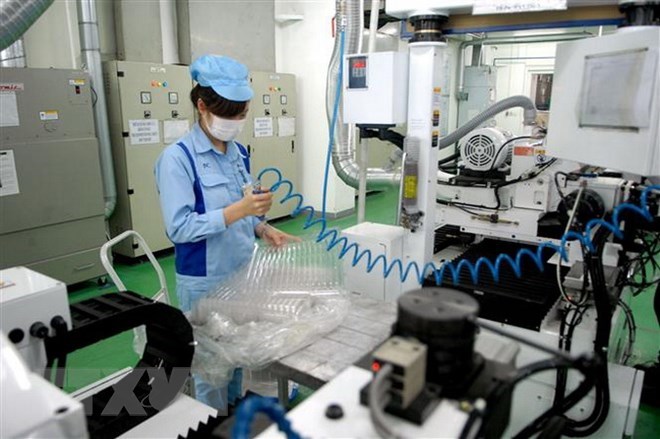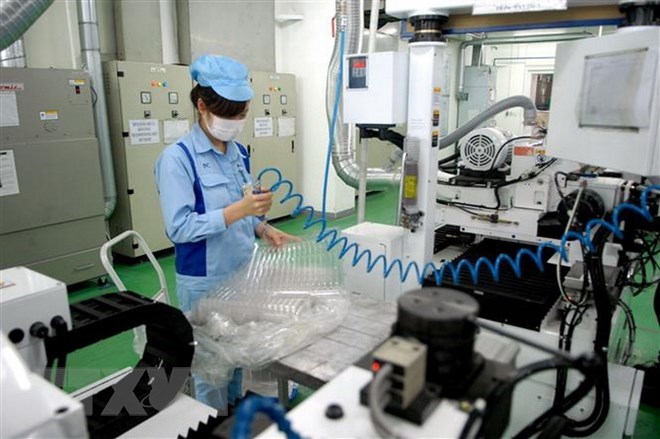
Hanoi continues to lead the country in drawing foreign direct investment (FDI) with more than 7.5 billion USD poured into the capital since the beginning of 2018, a 2.18-fold increase against the previous year.
A Japanese-invested production line of electronic products in Hanoi's Quang Minh Industrial Park (Illustrative image. Source: VNA).
Deputy director
of the municipal Department of Planning and Investment Tran Ngoc Nam revealed
the information at a regular press meeting of the Hanoi Party Committee on
December 25.
In 2018, the city has granted licences to 616 new FDI projects with total
registered capital of 5.03 billion USD, he said.
According to Nam, the capital has deployed a number of measures to improve
the investment environment and increase support for investors and businesses
from business registration to implementation of projects.
Particularly, the city has approved the simplification of 61
administrative procedures and pressed ahead with online business registration,
ensuring that relevant administrative procedures are completed within three
days.
Japan is the leading foreign investor in Hanoi with about 10.6 billion
USD, followed by Singapore, 6.9 billion USD, and the Republic of Korea, 5.5
billion USD, Nam said.
The field most attractive to foreign investors are real estate, which
absorbed 34.8 percent of total FDI, followed by processing and manufacturing
24.4 percent, information and communications 8.72 percent, and construction
6.29 percent, he added.
Source: VNA
According to data from the Hoa Binh Provincial Party Committee, the industrial production index for the first six months of 2025 is estimated to have increased by 20% compared to the same period last year. This marks the highest year-on-year growth rate for this period since 2020.
In the first six months of 2025, Hoa Binh province’s export turnover was estimated at 1.145 billion USD, marking an 18.11% increase compared to the same period in 2024. Import turnover was estimated at $ 804 million, a 17.15% increase, which helped the province maintain a positive trade balance.
The lives of the ethnic minority farmers in Tan Lac district have gradually improved thanks to the new directions in agricultural production. This is a testament to the collective strength fostered through the professional associations and groups implemented by various levels of the district’s Farmers’ Union.
With the motto the "product quality comes first,” after nearly one year of establishment and operation, Muong village’s Clean Food Agricultural and Commercial Cooperative, located in Cau Hamlet, Hung Son Commune (Kim Boi district), has launched reputable, high-quality agricultural products to the market that are well-received by consumers. The products such as Muong village’s pork sausage, salt-cured chicken, and salt-cured pork hocks have gradually carved out a place in the market and they are on the path to obtaining the OCOP certification.
In the past, the phrase "bumper harvest, rock-bottom prices" was a familiar refrain for Vietnamese farmers engaged in fragmented, small-scale agriculture. But today, a new spirit is emerging across rural areas of Hoa Binh province - one of collaboration, organisation, and collective economic models that provide a stable foundation for production.
Maintaining growing area codes and packing facility codes in accordance with regulations is a mandatory requirement for agricultural products to be eligible for export. Recently, the Department of Agriculture and Environment of Hoa Binh province has intensified technical supervision of designated farming areas and packing facilities to safeguard the "green passport" that enables its products to access international markets.



